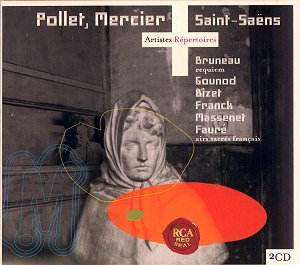Saint-Saëns’ Requiem, which with the Bruneau
takes up the first CD, was composed in a single week. If this
fact, combined with its subsequent neglect, leads one to suppose
a piece of instant craftsmanship, the results are very much more
than that. From the stabbing opening (which returns at the close)
to the striking organ entries during the Dies Irae it is clearly
born of true feeling. Its more intimate moments contain an abundance
of inventive textures to differentiate it from other Requiems
one has heard and, if the ear protests that sheer melodic appeal
is lacking, the last section provides this too. I can see that
it will never take the place of the Fauré, that most popular
of all French Requiems, but surely all those who enjoy the latter
piece will find much to attract them here.
Alfred Bruneau was, like Gustave Charpentier,
a friend of Emile Zola and a follower of the Italian veristi
rather than the impressionism of Debussy. His fairly early
Requiem contains much that is striking and surprising, together
with passages of more Gounod-like melodic swing. Whether the surprises
add up to a coherent whole, and whether they will satisfy on later
hearings when the surprise element has worn off, is difficult
to say of a work so rarely encountered. Those with a taste for
late-19th Century choral music will surely enjoy finding out.
They will get to know both works in heartfelt performances and
pleasing if not very detailed recordings. In view of the obvious
conviction of all concerned I see no point in going into detail
except to give an encouraging nod to the tenor whose vibrato seemed
excessive in 1989 but who had it well under control by 1994.
The writer of the note states that the Bruneau
Requiem had only three performances (1886 in London and Paris,
1907 in Amsterdam) before Mercier revived it and made the present
recording. I can tell him of at least one other: the work was
performed in London by the Bach Choir under Sir Charles Villiers
Stanford in 1895. Letters from Bruneau to Stanford are quoted
in Plunket Greene’s biography of the latter, and it can be seen
that Stanford found certain aspects of the piece "disquieting",
particularly the "bouche fermée" effects which
he asked to have altered. Bruneau told him firmly: "Unfortunately,
it will be impossible for me to modify the bouche fermée
passages which surprise you so much. They have their raison
d’être, their necessity in the poetic context of the
work... But, I beg you, do not hesitate in any way and if the
audacities of my Requiem disturb you, simply send the score back
to me, and this will not prevent us from remaining friends, as
in the past" (Stanford put up with the bouche fermée
and went on to conduct the work).
Those who acquire this album for the sake of
two interesting and neglected French Requiems will also be taking
on board a string of sanctimonious French religious pieces, often
decked out in mushy arrangements, the anonymity of which has my
understanding. Certainly, if I’d trashed up the Bach-Gounod in
this way I wouldn’t want the neighbours to know. However, these
"twofers" usually work out at about the price of a single
full-price CD so I wouldn’t let that put you off, after all you
can always throw the companion disc away.
I suppose I could leave it at that. But since
the package is actually touted as a star vehicle for Françoise
Pollet I suppose I should say something about her, too. She has
an interesting voice, very far from typically French with a dark
lower register and sumptuous upper tones. The comparison which
comes to mind is Mirella Freni, and I should say that I would
enjoy her far more in Puccini or Mascagni. When she uses her full
heft on the higher notes she can be thrilling, and here she sounds
secure. In mezzo pianos the voice loses its focus and the vibrato
becomes wobbly. There is some ungainly scooping at times – I should
hate to hear "En prière" given such heavily operatic
treatment with its original piano accompaniment – and altogether
too much of this is a model of how to present such music in its
worst light. She might also have realised that discretion is the
greater part of valour and done the Bizet Agnus Dei at least a
tone lower. The viciously un-vocal climax is positively screeched
out. This piece is not, as the note-writer seems to think, part
of the early Te Deum but an arrangement by Ernest Guiraud of the
Intermezzo from "L’Arlésienne". It was never
intended to be sung at all.
Of course there are those who like their religion
with plenty of artificial sugar in it – otherwise John Rutter
would have been out of business long ago – but the disc is not
wholly suitable for these people either, since there is also an
attempt to pair up the familiar with some less well-known items.
Thus, alongside "Panis Angelicus" we have a suggestion
that Franck’s oratorio "Rebecca" might deserve another
look. For all I know the suggestion may be quite misleading since,
on the evidence of the attractive movement included here, Gounod’s
"Rédemption" would call for revival. In reality,
though it has its moments, I wouldn’t condemn my worst enemy to
sit through the whole thing. Fortunately "Gallia" is
on hand to point out the unwisdom of reviving Gounod wholesale.
The famous "Jerusalem" finale, modestly stirring even
in this flabby performance, is no compensation for the endless
sequences and chromatic burbling that precedes it.
Still, forget CD 2 and enjoy the two Requiems.
Christopher Howell

